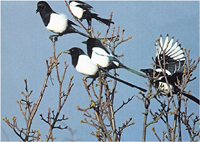Vermin-proofing your poultry: prevention of predation It is part of your duty of care to prevent your poultry being predated by all sorts of vermin. Where there is livestock and their food there will always be vermin, most of which either carry disease or attack the birds, so prevention is the best form of protection. Protect yourself from disease by wearing gloves when handling dead mice and rats. Types of vermin
Live catch traps are useful in case the wrong species is trapped but then there is the problem of despatching the beast. This must be done humanely and an air rifle at close range is probably the most accessible. Rat traps can also be the breakback type and must be set in a tunnel so that other species are excluded. Multicatch mouse traps can be placed inside the henhouse, but remember to check and empty them, the mice tend to die overnight. Feed and water should be inside the poultry house or a covered run. Feed should be stored in metal or plastic bins. The only open access to a henhut during the day should be a pophole and if magpies get through this, pin vertical strips of black binbag over it – the hens will push their way in but the magpies will not like the movement of the strips. Rat poison: now only allowed to be used by licensed vermin professionals as the chemicals are so toxic. Despite their cute antics in gardens, grey squirrels are a huge nuisance by taking food and eggs. They will eat (warfarin) poisoned maize but this must be placed in a special labelled device, again, to avoid targeting the wrong species. Access can be prevented for foxes, cats, mink etc. by the use of fencing or covered runs. Fencing needs to be over 2m high or with an overhang, plus netting on the ground to prevent digging or with an electric fence single wire at the base. Commercial electric netting is fine for keeping the chickens in but will not keep the fox out as it 1.5m is low enough for him to jump over.
Animals protected by law: owls, herons, hedgehogs, badgers, buzzards. |




